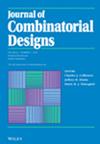Symmetric 2- ( 36 , 15 , 6 ) $(36,15,6)$ designs with an automorphism of order two
IF 0.8
4区 数学
Q3 MATHEMATICS
引用次数: 0
Abstract
Bouyukliev, Fack and Winne classified all 2- designs that admit an automorphism of odd prime order, and gave a partial classification of such designs that admit an automorphism of order 2. In this paper, we give the classification of all symmetric 2- designs that admit an automorphism of order two. It is shown that there are exactly nonisomorphic such designs, of which are self-dual designs. The ternary linear codes spanned by the incidence matrices of these designs are computed. Among these codes, there are near-extremal self-dual codes with previously unknown weight distributions.
对称 2- ( 36 , 15 , 6 ) $(36,15,6)$设计的二阶自变量
布尤克利夫、法克和温恩对所有允许奇素数阶自形化的 2- ( 36 , 15 , 6 ) $(36,15,6)$ 设计进行了分类,并给出了允许 2 阶自形化的此类设计的部分分类。在本文中,我们给出了所有对称 2- ( 36 , 15 , 6 ) $(36,15,6)$ 图案的分类,这些图案都包含一个阶为 2 的自动形。结果表明,恰好有 1 , 547 , 701 $1,547,701$ 非同构的此类设计,其中 135 , 779 $135,779$ 是自双设计。我们计算了这些设计的入射矩阵所跨的三元线性编码。在这些代码中,有一些近乎极端的自偶代码,其权重分布是以前未知的。
本文章由计算机程序翻译,如有差异,请以英文原文为准。
求助全文
约1分钟内获得全文
求助全文
来源期刊
CiteScore
1.60
自引率
14.30%
发文量
55
审稿时长
>12 weeks
期刊介绍:
The Journal of Combinatorial Designs is an international journal devoted to the timely publication of the most influential papers in the area of combinatorial design theory. All topics in design theory, and in which design theory has important applications, are covered, including:
block designs, t-designs, pairwise balanced designs and group divisible designs
Latin squares, quasigroups, and related algebras
computational methods in design theory
construction methods
applications in computer science, experimental design theory, and coding theory
graph decompositions, factorizations, and design-theoretic techniques in graph theory and extremal combinatorics
finite geometry and its relation with design theory.
algebraic aspects of design theory.
Researchers and scientists can depend on the Journal of Combinatorial Designs for the most recent developments in this rapidly growing field, and to provide a forum for both theoretical research and applications. All papers appearing in the Journal of Combinatorial Designs are carefully peer refereed.

 求助内容:
求助内容: 应助结果提醒方式:
应助结果提醒方式:


